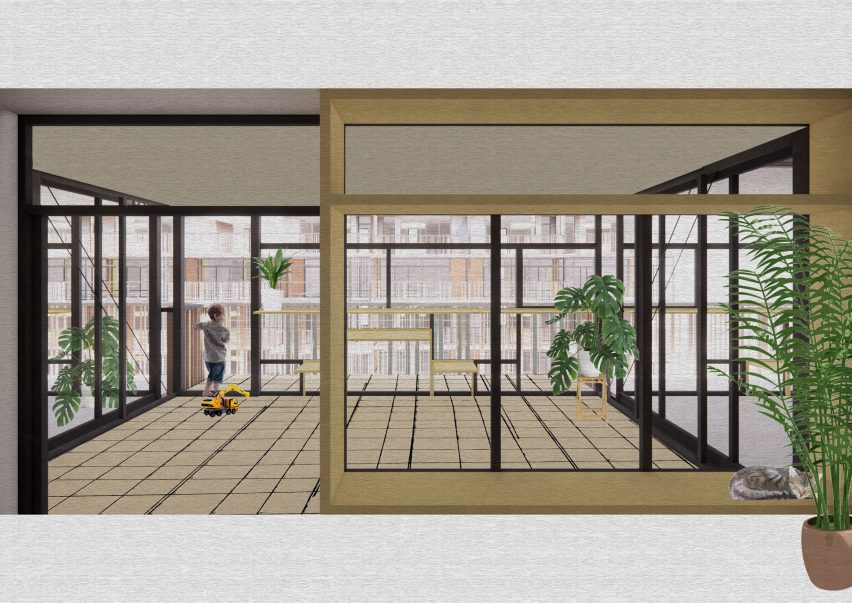
University of Westminster spotlights 10 architecture, environmental design and technology projects
Dezeen School Shows: a mosque located in the Royal Docklands that uses the Thames' tidal movements to harvest energy and a project that aims to revive St Dunstan in the East are included in Dezeen's latest school show by students at University of Westminster.
Also included is a food exhibition based at Haggerston Baths in Hackney and a project that uses red algae to tackle buildings' poor energy performance.
University of Westminster
School: School of Architecture and Cities
Courses: Architecture BA, Architecture and Environmental Design BSc, Architectural Technology BSc, Interior Architecture BA, MArch RIBA Part II
Tutors: Arthur Mamou-Mani, Toby Burgess, Alessandro Ayuso, Mary Konstantopoulou, Diony Kypraiou, Allan Sylvester, Ro Spankie, Julian Williams, Tabatha Mills, Hocine Bougdah, Adam Thwaites and Dr Paolo Zaide
School statement:
"The School of Architecture and Cities offers a wide range of undergraduate and postgraduate courses as well as research degrees. Students enjoy state-of-the-art facilities, including the extensive Fabrication Laboratory and dedicated open-plan design studios.
"Open 2022 is a hybrid exhibition, created by the school's staff and students, which reflects the varied design approaches of the School of Architecture and Cities and their place at the heart of London.
"Part of London Festival of Architecture 2022, the show features 750 student projects, drawing on the vast body of developmental and finished work imagined and realised over the course of the last academic year.
"The show launched online and in-person on 16 June and runs until 11 July. Tickets for the opening night are bookable via Eventbrite."
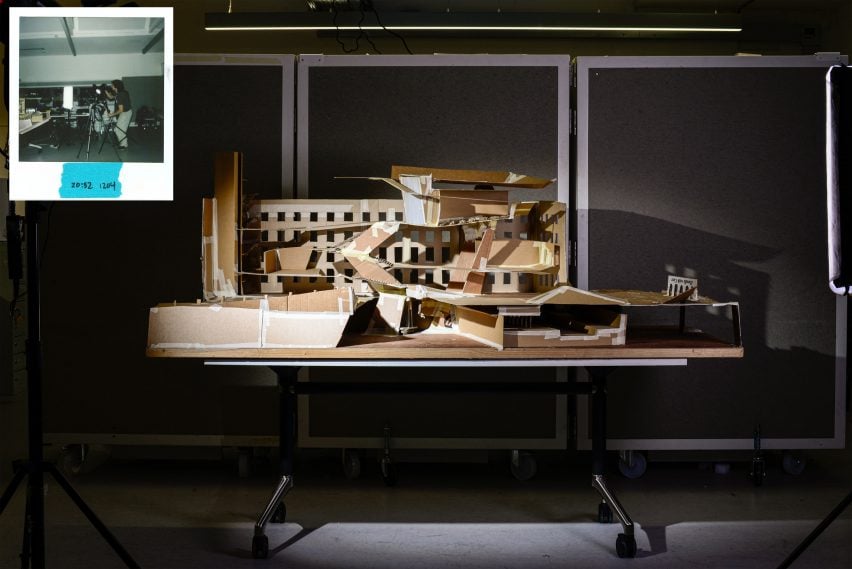
The Urban Theatre of Printing and Making by Jan Macbean
"This multi-faceted proposition explores issues of spatial, material, social and cultural porosities through the different notions of 'making'.
"The urban and architectural strategies foreground the public realm and community through the design of a theatre and theatrical journeys that juxtapose the new built with site-specific features of interest.
"Importantly, the practice of architecture is simultaneously articulated through physical acts of making where sustainability is embedded in design processes developed through recycling and the use of recycled materials only.
"The innovation and exciting architectural conversations notwithstanding, this further serves as a firm reminder of the climate we are currently operating in."
Student: Jan Macbean
Course: Architecture BA
Tutors: Constance Lau and Stephen Harty
Email: janldmacbean[at]gmail.com
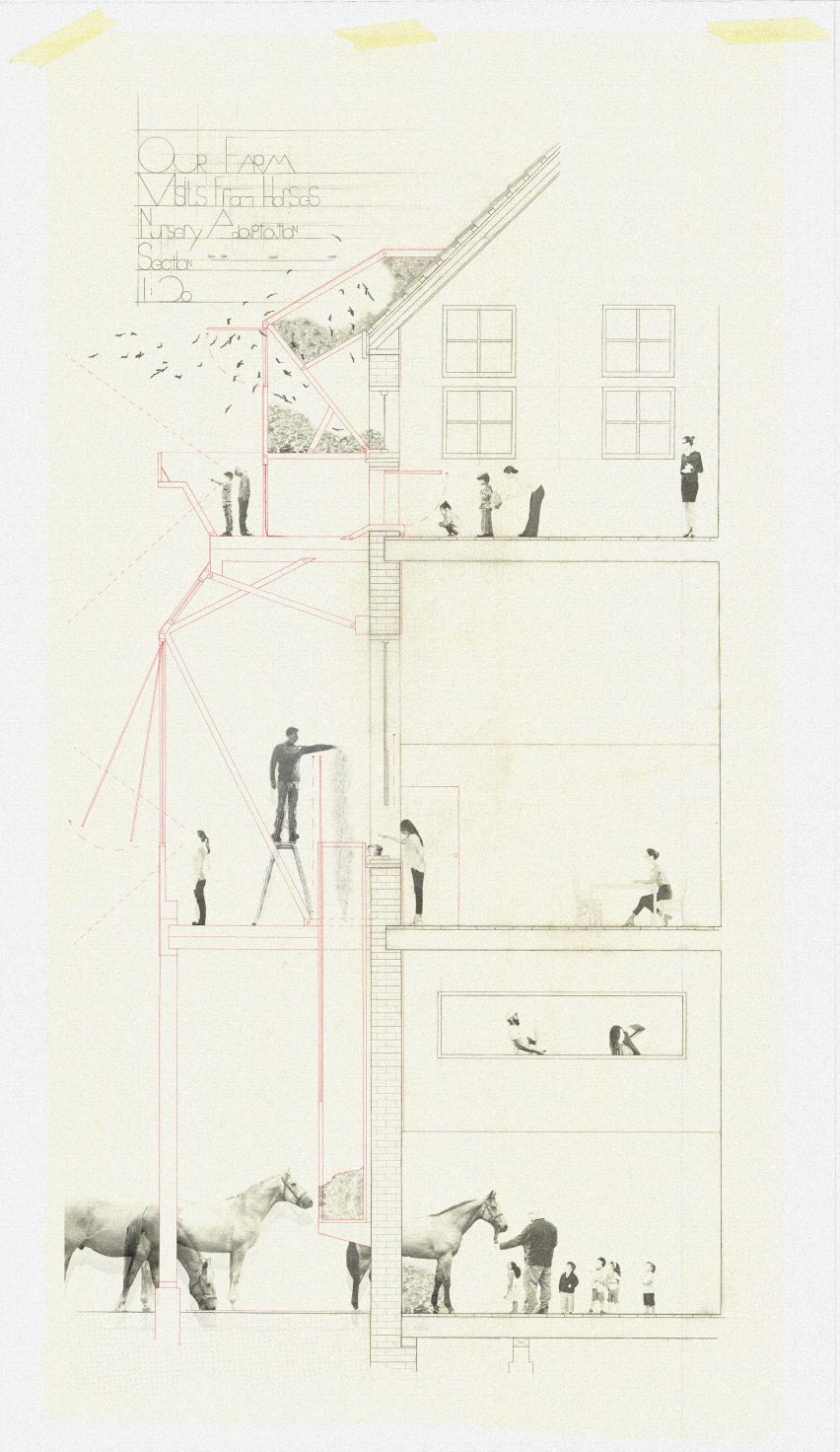
Our Farm by Joshua Dalsan
"Set in the backlands of Camden, 'Our Farm' proposes the important and exciting adaptation to Rhyl Primary School to welcome the local City farm animals into the Victorian building and turn the student's curriculum upside down.
"Eventually, sheep will teach maths and PE will indeed be horse riding, but for now, students will learn to have their lunchtime with goats.
"Studio DES3.6, focuses on adaptive reuse. Our process follows chance operations, and a careful study of the as found state including the making of 1:1 technical drawings and fragments using recycled materials."
Student: Joshua Dalsan
Course: Architecture BA
Tutors: Camilla Wilkinson and Kester Rattenbury
Email: Joshuadalsan[at]gmail.com
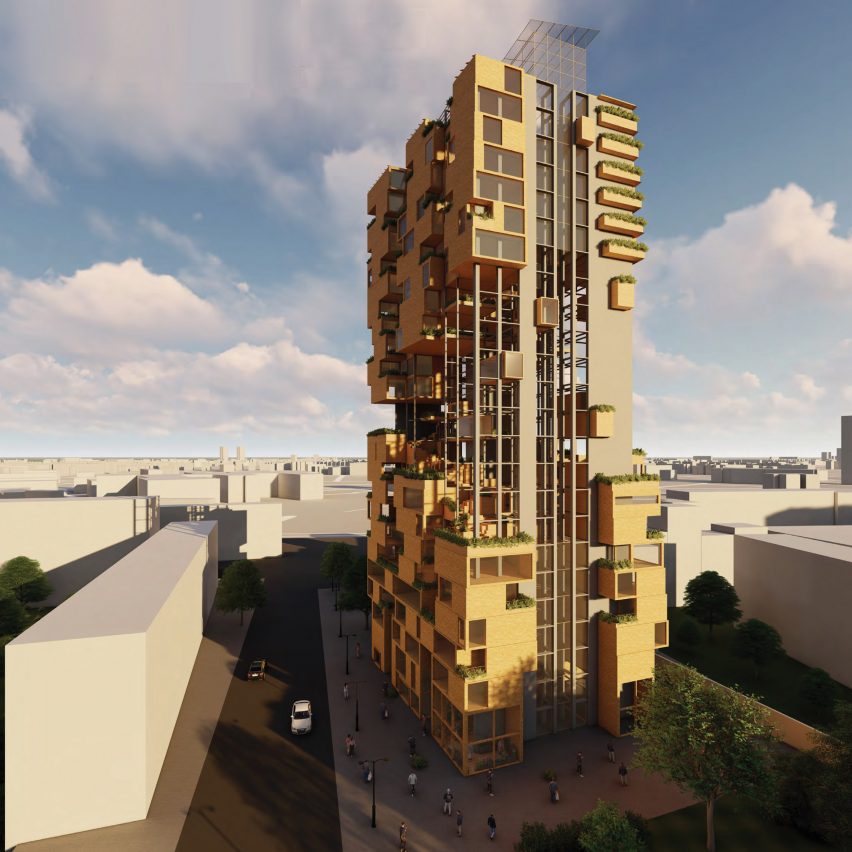
Ferrier Point, Newham by Edoardo Ripamont
"The proposal retrofits Ferrier Point in Newham to turn it into a dynamic, socially-diverse building better suited to the needs of the young demographic in the area. The inert mass of the existing tower is fragmented into individual cells and communal living spaces are added.
"Sunrooms, balconies, floating rooms, and apartments not only enrich the spatial experience but also function as passive environmental strategies to improve thermal comfort.
"Prefabricated cells made of recycled timber are easily attached and removed when their lifespan is over. The combination of passive environmental strategies and materials with better insulation properties help reduce the tower’s carbon footprint."
Student: Edoardo Ripamont
Course: Architecture and Environmental Design BSc
Email: [email protected]
Tutors: Stefania Boccaletti
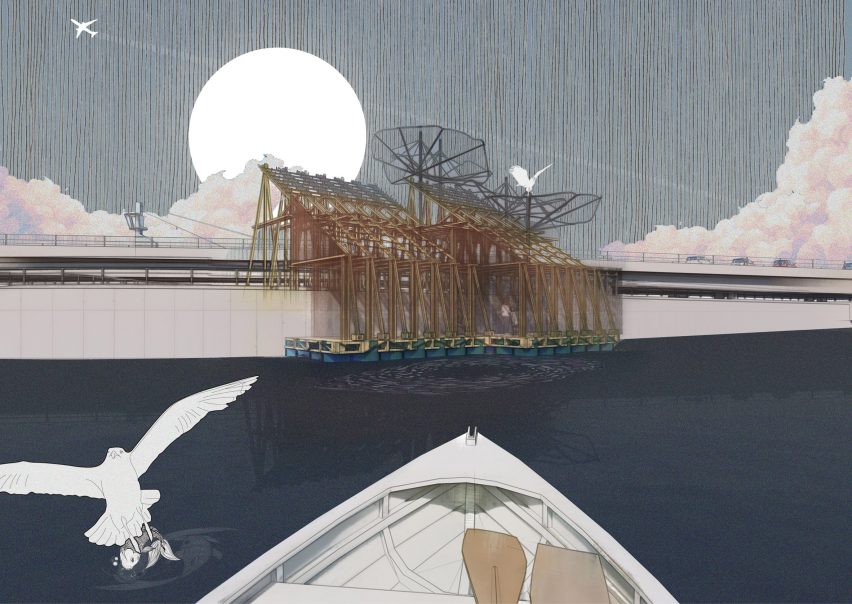
The water healing mosque of Royal Docklands by Suha Faisal Valiyaveettil
"The project's ambition is to use water as a symbolic, social, and environmental factor to break down social barriers and provide resilient cultural places in the Royal Docklands – an area socially neglected and prone to future flooding.
"The final design consists of a mosque in which water performs both symbolically (as a spiritual purifier) and environmentally by using the tidal movement of the Thames to harvest energy.
"The challenge is to combine aesthetic and cultural concerns with environmental ones in order to set the foundations of a circular local economy and embrace the requirements of simplicity and modesty of Islam."
Student: Suha Faisal Valiyaveettil
Course: Architecture and Environmental Design BSc
Tutors: Stefania Boccaletti
Email: w1737361[ar]my.westminster.ac.uk
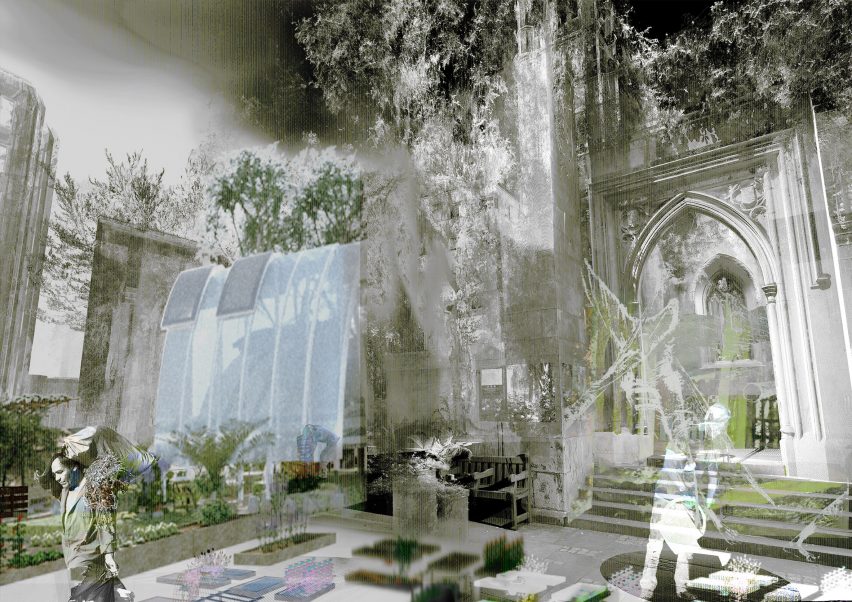
The Resurrection of St Dunstan in the East by Nikol Kaso
"My proposal for St Dunstan in the East aims to embrace the significance and meaning embedded within the ruins while giving them a second life through the notion of reuse.
"Any abandoned space is devoid of life and it is brought to life when the pulse of a human being extends over it. This is something my proposal of reviving St Dunstan in the East aims at doing.
"A new intervention with the intention of reviving life back in the ruins would operate with an approach of differentiation and responding to current needs. Moreover, it would still be felt in continuum with the historical narrative of the building."
Student: Nikol Kaso
Course: Interior Architecture BA
Tutors: Diony Kypraiou, Allan Sylvester, Ro Spankie and Julian Williams
Email: w1757163[at]my.westminster.ac.uk
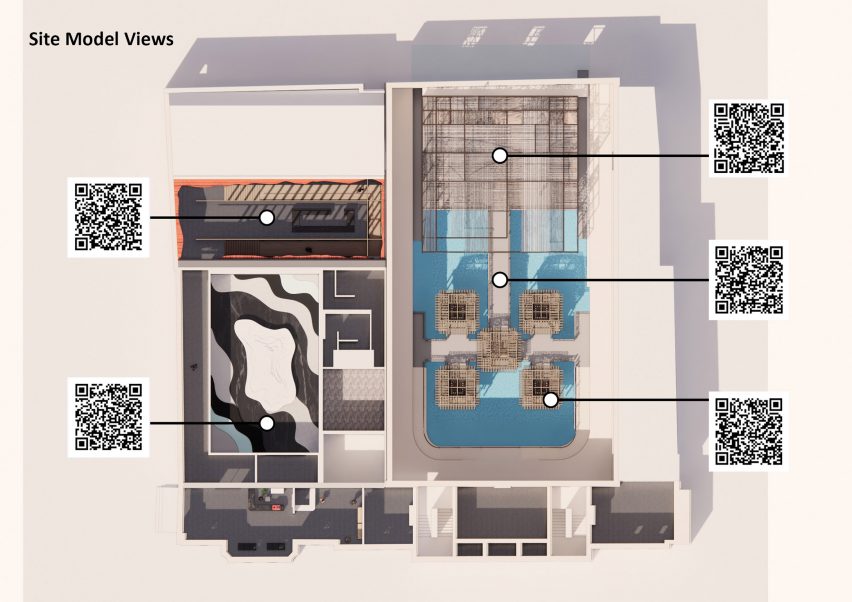
The Mian Museum by Zhengyao Hu
"The Mian Museum is a food culture exhibition space based at Haggerston Baths in Hackney that aims at rectifying and popularising 'authentic' Chinese food and culture. The project introduces to visitors the essence of Chinese food culture through a series of interactive and atmospheric experiences.
"Two different routes are 'choreographed' representing the eating culture and history of northern and southern China. From showcasing different noodle-making techniques and eating habits, through to experiential exhibition rooms, the project manifests into a food hall designed in the swimming pool area at the end of the visitors' route to offer a taste of what was learned on the journey."
Student: Zhengyao Hu
Course: Interior Architecture BA
Tutors: Diony Kypraiou, Allan Sylvester, Ro Spankie and Julian Williams
Email: zyxui1103[at]outlook.com
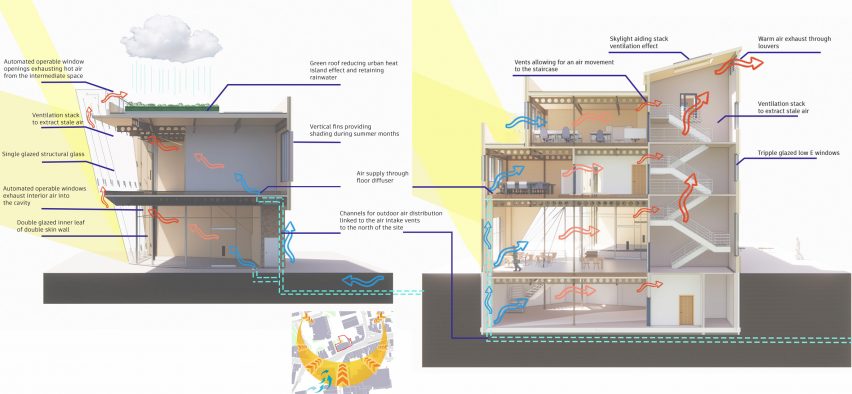
The Peckham Project by Zuzanna Jodlowska
"The Peckham Project aims to give a voice to the community where residents and local artists can feel represented and have ownership of the public space. Multi-function exhibition spaces and a hall enable connectivity and inclusiveness.
"Coworking spaces and services located in the building provide the conditions to exchange and develop ideas whilst generating income to fund ongoing and future community programmes.
"The building employs a range of passive environmental strategies to construct an environmentally sustainable community space. The design makes the building adaptable to climate change, integrating natural ventilation and solar shading strategies to keep running costs and carbon footprint to a minimum."
Student: Zuzanna Jodlowska
Course: Architectural Technology BSc
Tutors: Tabatha Mills, Hocine Bougdah and Adam Thwaite
Email: jodlowska.zuza[at]gmail.com
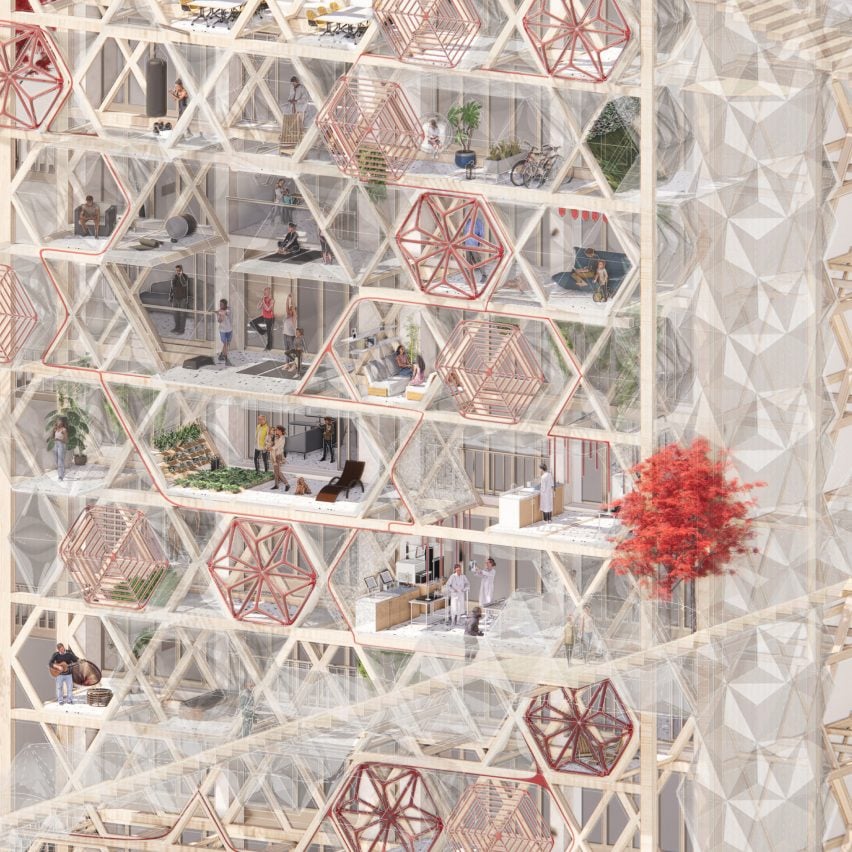
Pocket Curiosities by Lilla Porkolab
"This is a design that retrofits existing buildings with poor energy performance, tackling the gas and energy crisis, while harnessing waste heat from underground rail tracks for efficient, novel and renewable energy systems.
"Inflatable, agar-based bioplastic membranes are secured within a timber sub-structure.
"Red algae is utilised on building facades for the manufacture of insulative architectural components and powerful antioxidant, astaxanthin. New, adaptable spaces are provided for existing residents and the local community."
Student: Lilla Porkolab
Course: Master of Architecture (MArch) (RIBA pt II)
Tutors: Arthur Mamou-Mani and Toby Burgess
Email: lilla.porkolab[at]hotmail.co.uk
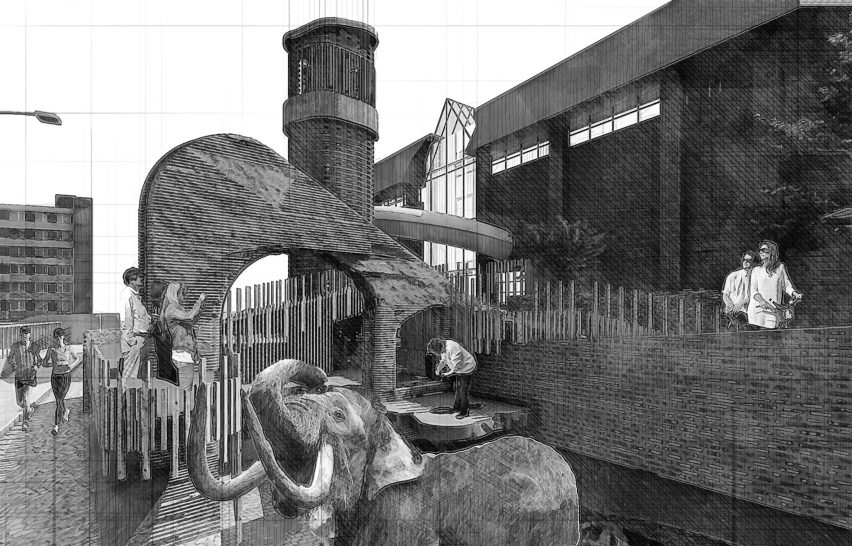
Here be Mawoolies: Architecture behind the regeneration of the River Thames by Asena Koksal
"This project is described through an archaeological dossier from a thousand years in the future, looking back to our near future. It explores human-animal coexistence in the ecology of the Thames' shore.
"This project brings back the epic Woolly Mammoth to London to help regenerate the Thames ecosystem.
"A master plan extends the cultural programmes of south London into Woolwich and features Mawooly paths where the genetically-engineered creatures shore up the river’s edge through grazing and traversing.
"The porous clay and concrete theatre is a civic space where public paths intertwine the shoreline and urban fabric, punctuated by monumental volumes containing performance spaces.
"Joyfully vibrant and inclusive for all – even for a herd of gigantic mammals – the building celebrates the Mawoolies as they become co-inhabitants of not only the building but also of Woolwich itself."
Student: Asena Koksal
Course: Master of Architecture (MArch) (RIBA pt II)
Tutors: Alessandro Ayuso and Mary Konstantopoulou
Email: asenakoksal[at]gmail.com
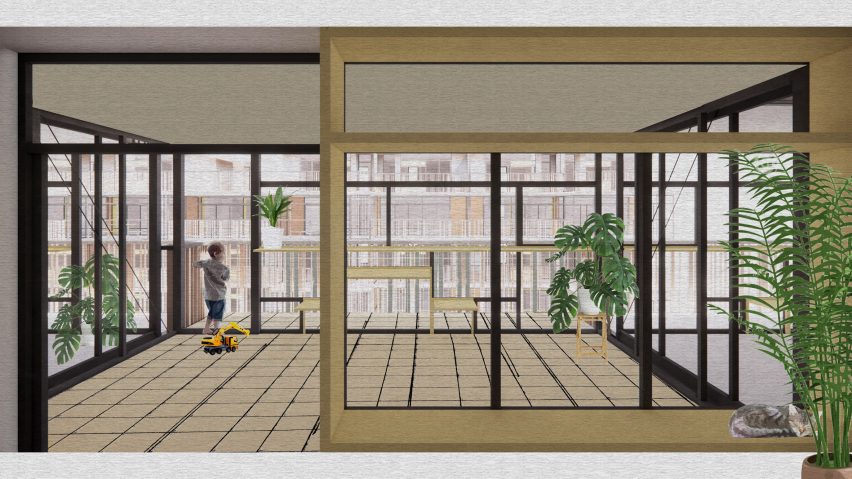
Catford Urban Vision by Malgorzata Socha
"Catford Urban Vision is a masterplan proposal for the transformation of the heavily car-dominated Central Catford into a pedestrianised island. It has been developed as an alternative to the developer lead Catford regeneration scheme, heavily criticised by the local community.
"Within the masterplan, the 1970s Milford Towers Housing Estate is proposed to be retrofitted with the additions of winter gardens and balconies to existing flats.
"The project also sees the currently very disconnected estate being linked to its context through additional access points connecting the existing shopping centre underneath it to a newly developed shopping platform within the estate."
Student: Malgorzata Socha
Course: Master of Architecture (MArch) (RIBA pt II)
Tutors: Richard Difford and Sean Griffiths
Email: malgorzatasocha1995[at]gmail.com
Partnership content
This school show is a partnership between Dezeen and University of Westminster. Find out more about Dezeen partnership content here.
Dezeen is on WeChat!
Click here to read the Chinese version of this article on Dezeen's official WeChat account, where we publish daily architecture and design news and projects in Simplified Chinese.